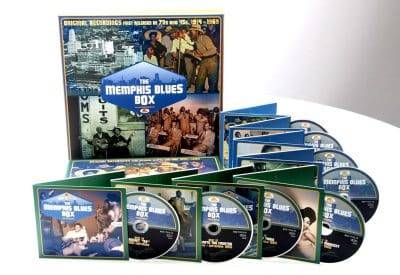The Memphis Blues Box Original Recordings First Released on 78s and 45s, 1914-1969
 The Memphis Blues Box
The Memphis Blues Box
Original Recordings First Released on 78s and 45s, 1914-1969
Bear Family
Here are the staggering numbers: 534 songs, 161 artists, 360 11×11 pages in a hefty hard-bound coffee table book, 20 CDs, 13 years in the making, for a total weight of 10.5 lbs. How can we possibly do justice to such an uber-ambitious project in the space of a regular review? The answer is that this won’t be a regular review but instead a description of the project. First off, kudos to Martin Hawkins, the mastermind behind this endeavor and the writer of the Introduction, multiple essays, as well as much of the content relating to the artists and the specific tracks. Within there are insightful essays from Charlie Musselwhite, David Evans, Paul Swinton, Richard Raichelson, and Tyler Fritts. Those various essays and vintage photographs and advertisements consume 80 pages. The artist profiles have110 pages or so, and another 148 contain descriptions of each track. One could literally spend months to listen as well as absorbing the printed content. It is overwhelming but a treasure trove for blues fans and scholars alike.
The recording quality, considering the vintage of the material is as good, if not better than one could hope for. While many of the names may obviously be obscure, here’s a feeble attempt at highlighting some of the more recognizable ones by Disc:
Disc One – 1914-27 – Memphis Jug Band, Beale Street Sheiks, Will Weldon
Disc Two – 1927-28 – Frank Stokes, Jim Jackson, Cannon’s Jug Stompers
Disc Three – 1928 Continued – Frank Stokes, Jim Jackson, Cannon’s Jug Stompers, Furry Lewis
Disc Four – Late 1928 – Mid 1929 – Robert Wilkins, Will Shade, Furry Lewis
Disc Five – Later 1929 – Frank Stokes, Jim Jackson, Cannon’s Jug Stompers, Furry Lewis, Sleepy John Estes, Robert Wilkins
Disc Six – Late 1929 – Early 1930 – Memphis Minnie, Cannon’s Jug Stompers, Memphis Jug Band, Robert Wilkins
Disc Seven – 1930 Continued – Mattie Delaney, Memphis Jug Band, Sleepy John Estes
Disc Eight – May to November 1930 – Noah Lewis, Memphis Sheiks, Jimmie Lunceford
Disc Nine – 1930 -1936 – South Memphis Jug Band, Minnie Wallace, Memphis Minnie
Disc Ten – 1938 – Mid 1939 – Memphis Minnie James DeBerry & His Memphis Playboys
Disc Eleven – Mid 1939 – December 1941 – Bukka White, Memphis Slim, Yank Rachell
Disc Twelve – 1946 – Early 1951 – B.B. King, Joe Hill Louis, Lost John Hunter
Disc Thirteen – 1951 Continued – Rosco Gordon, Rufus Thomas, Howlin’ Wolf
Disc Fourteen – Mid 1951 – January 1952 – Rosco Gordon, Rufus Thomas, Howlin’ Wolf, Ike Turner, Little Junior Parker
Disc Fifteen – January – September 1952 – Johnny Ace, Bobby “Blue” Bland and those above
Disc Sixteen – Late 1952 – Spring 1953 – Walter Horton, Johnny Lewis, Ma Rainey
Disc Seventeen – May 1953 – July 1954 – James Cotton, Little Milton, Elvis Presley
Disc Eighteen – October 1954 – Early 1957 – Rufus Thomas, Sonny Burgess, Carl Perkins
Disc Nineteen – 1957 – 1965 – Eddie Boyd, Booker T. and MGs, Willie Cobbs, Willie Mitchell
Disc Twenty – 1966-1969 – Albert King, Junior Parker, Ike and Tina Turner, Bobby “Blue’ Bland
The attention to detail here is mind boggling, a testament to the thorough research. Just for a brief insight, here is a track description from the early period, Furry Lewis “Black Gypsy Blues” (Disc 4) and then another of Albert King’s iconic “Crosscut Saw” (Disc 2)
Furry Lewis – Released on December 1, 1930, this song shows evidence of hoodoo, a combination of folk practices that stems from African and Caribbean roots. Some black American fortune tellers of African roots were also known by the European description “gypsies.” Fairly typical of Lewis’ lyric composition, he begins with two rhymed couplets, one after the other that directly confront the ‘Black Gypsy” theme. As the blues progresses, though, the connection dissolves and while the narrator’s mistreatment by his female companion is a theme in the final two verses, neither makes mention of anything supernatural.
Albert King – Continuing the tale of the crosscut saw from where Wilroy Sanders left it, this “cover” recording by Albert King became and R&B hit in January 1967, peaking only at number 34 but going on to become considered a classic of ‘modern” blues. It appeared later in longer form on a King album for which production credit was given to drummer Al Jackson. A feature of the single was the faraway mix of the vocals, which can barely be heard over this guitar workout set to a Latinesque beat. Several people have claimed they suggested that King record the song. From disc jockey ‘Moohah” to singer William Bell, and on to Al Jackson. Others have suggested that the line ‘I can cut your wood so easy’ was an important factor and was a follow-on to Eddie Floyd’s hit Knock on Wood, but this seems unlikely, not least because the words are very secondary here. The copyright on the song was not well researched by Stax and was credited to “Ford” despite the song’s long history.
There are descriptions like these, many of which are lengthier for all 534 songs. The holiday break is not nearly enough time to digest the voluminous morsels of content herein, but one cannot help but be awestruck by the details and relentless work that went into this ‘labor of love.’ – Jim Hynes
Buy Us a Cup of Coffee!
Join the movement in supporting Making a Scene, the premier independent resource for both emerging musicians and the dedicated fans who champion them.
We showcase this vibrant community that celebrates the raw talent and creative spirit driving the music industry forward. From insightful articles and in-depth interviews to exclusive content and insider tips, Making a Scene empowers artists to thrive and fans to discover their next favorite sound.
Together, let’s amplify the voices of independent musicians and forge unforgettable connections through the power of music
Make a one-time donation
Make a monthly donation
Make a yearly donation
Buy us a cup of Coffee!
Or enter a custom amount
Your contribution is appreciated.
Your contribution is appreciated.
Your contribution is appreciated.
DonateDonate monthlyDonate yearlyYou can donate directly through Paypal!
Subscribe to Our Newsletter
Discover more from Making A Scene!
Subscribe to get the latest posts sent to your email.














































